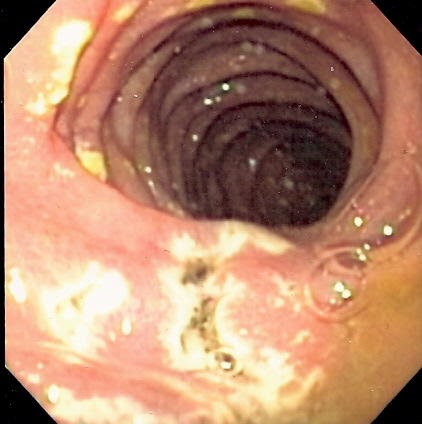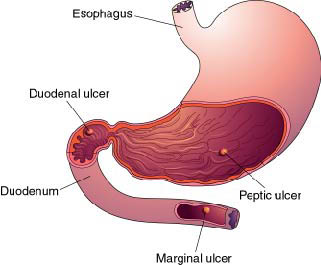
A peptic ulcer is simply a painful sore inside the stomach, small intestines or stomach
Peptic ulcers in the stomach is usually called a duodenal ulcer. The most common symptom of an ulcer in the stomach is abdominal pain accompanied by nausea and vomiting.
An ulcer on the small intestine is also referred to as a duodenal ulcer. It occurs inside the stomach and intestines. A person affected with a small intestinal ulcer will have bleeding in the stool. The bleeding is usually a few centimeters in diameter. The person may experience abdominal cramps and bowel movements too slow.
Peptic stomatitis is another term used to describe an ulcer that is present inside the stomach or intestines. A person suffering from peptic stomatitis will be suffering from symptoms such as diarrhea and mucus in their stools.
Septic arthritis is a term used to refer to an ulcer that happens inside the bones inside the stomach. This type of ulcers can affect any part of the digestive tract, especially the small intestines and the duodenum. The symptoms of this condition include nausea, vomiting, abdominal pain, bloating and abdominal cramping. These are the common symptoms of other ulcers.
Ulcerative colitis is a condition where the walls of the colon become inflamed due to an ulcer or infection on the colon. The patient suffering from ulcerative colitis usually exhibits signs of nausea, abdominal pain, fatigue, weight loss, constipation, diarrhea and vomiting.
Ulcerative esophageal reflux disease is a disease that involves the flow of acid, bile and phlegm into the esophagus, causing discomfort and difficulty in swallowing. This disease is generally caused by a bacterial or fungal infection inside the body. The symptoms include heartburn, vomiting, difficulty in swallowing and fever. This disease is often treated with antibiotics. Ulcerative colitis can cause death of the patient.
Gastric and duodenal ulcers can form in any part of the digestive system. However, they tend to be more prevalent in patients suffering from diabetes, AIDS and those with renal or liver problems. Gastric ulcers can cause serious complications, if they are not detected and treated at the right time.
Peptic disorders are usually detected by consulting your doctor so that he or she can refer you to a proper specialist. Your doctor can assess your case and recommend you the appropriate treatment for peptic disorders.

One of the most common ways to detect a peptic ulcer is by the presence of blood in your stool
The presence of blood in the stool indicates the presence of an ulcer in your stomach. You should also avoid eating spicy and citrus foods as they can irritate the symptoms of peptic ulcer and cause ulcers to spread throughout your body.
There are several treatment methods available to prevent ulcers. These treatments include medicines, surgical procedures and dietary change.
Antacids are the first option taken for treating peptic ulcers. They are basically non-steroidal anti-inflammatory medicines that are given to stop the symptoms of peptic ulcers. It is very effective but has side effects. The side effects include nausea, diarrhea, vomiting, cramps and bad breath.
Peptic ulcers can be treated with medicines like aminosalic acid, nystatin, and troches. These medicines are mostly used in cases of malignancies. However, these medicines can also cause serious side effects.
Ulcer surgery is one of the most effective methods of treating peptic ulcers. The surgery involves removing the ulcer and cleaning the affected area to reduce the pain and promote healing. Surgery for peptic ulcers usually involves removal of the ulcer.
Surgical procedure for peptic ulcers is usually recommended if the affected area is big. In addition, if the ulcer is deep in the gastric lining, then the surgery is called a duodenal switch surgery. This procedure involves opening the duodenum to remove the ulcer.
If you are unable to treat your peptic ulcers with medicines, you can undergo surgery to remove the ulcer. The operation can be performed on an outpatient basis and requires general anesthesia. Although this type of surgery is more expensive than other procedures, it gives quick results.
Peptic ulcers can be prevented with proper diet and proper care. The sooner you catch them, the better chances of reducing the effects of peptic ulcers. So, do not ignore your symptoms and visit your doctor immediately if you feel any symptom that suggests you have peptic ulcers.